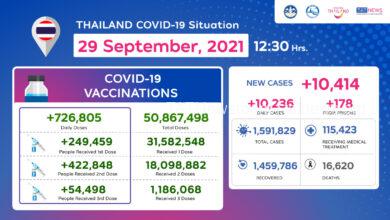CF-Hotels: Your Environmental Health Check for Sustainable Thai Tourism
Twenty or 30 years ago, climate change was still a distant problem for most people and even now, some still believe that protecting the environment is the responsibility of the government and the private sectors. However, with daily temperatures regularly exceeding 40 degrees Celsius and hitting record highs every year, more and more people are becoming aware of the effects of climate change on their lives.
As global warming gets closer to home, all sections of society – not just the government and private sector but the public itself – have started working towards combating climate change. On the tourism side, 2019 data from the World Travel & Tourism Council (WTTC) shows that the global tourism industry contributed 8% of total greenhouse gas emissions or about 4,500 million tons of carbon dioxide. Of this, 75% came from travel, 21% from travel services and accommodation, and 4% from other tourism activities.
Hence, the Tourism Authority of Thailand (TAT) is committed to encouraging environment-friendly business practices and tourist behavior while promoting more responsible tourism through various campaigns. In the latest such move, TAT recently joined hands with Chiang Mai University’s Energy, Economic and Ecological Management research unit to develop CF-Hotels. This online platform allows hotels both large and small to contribute to reducing greenhouse gases and their carbon footprint. (A carbon footprint or CF consists of the total amount of greenhouse gas a company, country, or individual adds to the atmosphere.) This free and easy-to-use online tool can be found at cf-hotels.com and is designed to serve as a 24-hour environmental consultant for tourists and operators.
Hotel operators can learn more about CF-Hotels at www.cf-hotels.com.
Check your hotel’s environmental health with CF-Hotels
“CF-Hotels operates like a health check-up. Users start by filling out a form to provide all the relevant information. The form is easy to understand and asks for simple data such as units of electricity used, quantity of wastewater produced, and other factors. Using this information, the platform calculates the hotel’s carbon footprint. The hotel operators can then use the information available on the website to compare other hotels. This way, you will know exactly how much carbon your hotel emits,” said Assoc Prof Dr Sate Sampattagul, an expert in environmental planning and management from Chiang Mai University’s Faculty of Engineering.
He added that the CF-Hotels platform is easy for hoteliers to use and requires no expertise.
“It’s as simple as making an income-and-expenses account. Once you have tried it for the first time, it becomes very easy,” said the professor, who led the team that developed the platform.

TAT Governor Thapanee Kiatphaibool said “Building an environmental inventory database is still new to the Thai tourism industry. The aim is to promote credibility and demonstrate the sincerity of hotels with eco-friendly operations. The information provided on the CF-Hotels platform reflects business operations as truthfully as possible and aims to reduce so-called greenwashing through environmental activities. Our objective is to get hotels to focus on climate action.”
CF-Hotels is free, easy to use, and promotes green tourism
Dr Sate explains that although many platforms to check carbon footprints already exist, similar tools for the hotel industry are rare. And while large hotel chains can hire companies or experts in environmental management to deal with this issue, smaller operators are often left behind.
“The advantage of the CF-Hotels platform is that it is free of charge for Thai businesses. In comparison, users have to pay for this service in many foreign countries. This pilot project was initiated by TAT to collect information generated by the platform, which can be used for the past 1 year and stored as further information. It can also be used to issue certificates to hotels that make significant progress in addressing environmental problems,” Dr Sate said.
“The numbers compiled can also be used as official baseline data for other environmental activities, such as requesting a carbon footprint certificate CFO (Carbon Footprint Organization) from greenhouse gas management organizations, bidding for contracts under the government’s Green Procurement Project, or when applying for ISOs at the international level.”
Another advantage of CF-Hotels is that small, medium, and large hotels can use the platform as soon as they have registered. The research team said that confidential information will not be leaked as results displayed in the system are just information processed for summary. Competing hotel operators will not have access to rival hotels’ data as all the information will be protected.
The TAT governor explained that as well as building an environmental inventory database, each hotel can use its report generated by the platform to seek certification from international agencies such as the Global Sustainable Tourism Council (GSTC) and Travelife Sustainability.
“TAT also offers benefits to operators participating in the CF-Hotels project, including discounts on entry fees for TAT tourism promotion events such as the Thailand Travel Mart Plus (TTM+) in 2024 and the World Travel Market in London. This gives small operators the chance to be selected to showcase their services on the Agent/Media Fam Trip and generate interest among agents interested in environmental care. They also get the chance to join the list of hotels issued by TourismCares, a US organization promoting sustainability in the tourism industry via the Meaningful Travel platform. Currently, there are 5 CF-Hotels member hotels have been listed in TourismCares out of a total of 9 hotels in Thailand,” said Thapanee.“It’s a great opportunity for hotels to reach eco-conscious travelers in the US.”
Reducing carbon footprints: A growing concept in global tourism
Globally, efforts to reduce the carbon footprint of the hotel and tourism industry are not new. Many international hotel booking applications feature environmental stars, while airlines offer the redemption of air miles for reforestation and reduced use of single-use plastics. Thailand already has the Thai Hotel Association’s Green Leaf Project, and more travelers are showing environmental awareness by choosing hotels with the “Green” stamp.
Green tourism is fast becoming a global trend and businesses have started realizing the benefits. Some hotels are using points systems or cryptocurrency to reward customers who help reduce pollution and carbon emissions. The points can often be used for free stays or discounts. Several hotels in Bangkok have started taking this approach, so reducing carbon footprints is no longer a foreign concept.
“Tourists today are more concerned about the environment, which affects their decision-making and will become even more important in the future. According to data from WTTC and Trip.com Group, 69% of global travelers are looking to travel sustainably. Also, the TAT Review shows that Gen Z Thai travelers prioritize eco-tourism and want to support companies that focus on society and the environment (Buying=Voting),” Thapanee said.
“Gen Z tourists and their offspring are the groups that will suffer intense effects of climate change. Therefore, they are concerned about the environment. Hence, when choosing accommodation, they prioritize a hotel’s eco-friendliness apart from price and quality.”
One example of CF-Hotel members adjusting their marketing strategy to match this change in consumer behavior is The Motifs Eco Hotel, a small hotel in the heart of Chanthaburi province. Under the concept of “a hotel that breathes with nature and community”, the hotel has been designed to maximize the use of natural resources such as rainwater, natural lighting, and wind, while minimizing energy consumption. The interiors showcase local materials, while the restaurant focuses on seasonal ingredients. The staff are also locals.
“The Motifs Eco Hotel offers more than just environmental design, it integrates environmentally-conscious functions while incorporating carbon footprint reduction into the guests’ lifestyle. This will also create a lasting impression on customers,” the TAT governor said.
CF-Hotels goes far beyond just hotels
Over 100 hotels have registered for CF-Hotels so far, while its designers hope to expand the platform to cover other tourism-related businesses and services such as restaurants, spas, convention centers, and tourist spots.
“The feedback we receive will be used to make further improvements and will be enormously useful in preparing modern businesses for new sustainability policies and measures, including carbon tax,” said Dr Sate, citing the platform’s role as a consultant for hotels working on reducing their carbon footprint.
TAT Governor Thapanee also highlighted the importance of encouraging hotels of all sizes to participate in reducing their carbon footprint.
“In working with partners like tour operators, airlines, and even influencers, the TAT has learned that European tourists prioritize sustainability as well as the quality of their experience during their stay in Thailand. This is in line with results from a survey of global public opinion on climate change issues conducted by Meta in collaboration with Yale University’s Program on Climate Change Communication,” Thapanee said.
“The survey covered more than 100,000 Facebook users in nearly 200 countries and showed that Europeans, especially, are very concerned about climate change and consider it a threat to our lives as well as those of future generations.”
At the 26th Conference of the Parties (COP26), Thailand agreed to work on reducing greenhouse gas emissions by at least 20% and aim to reach 25% by 2030. TAT itself has set Sustainable Tourism Goals (STGs) in line with the United Nations’ Sustainable Development Goals (SDGs). The effort has been adapted for Thai tourism by encouraging hospitality operators to use the CF-Hotels platform and set a goal of reducing greenhouse gas emissions by at least 5% per year.
Also, the Office of Natural Resources and Environmental Policy and Planning is coordinating with the German International Cooperation Organization (GIZ) to set up a Thai Climate Initiative (ThaiCI) fund. The ThaiCI will provide financial support to investors in greenhouse gas reduction innovations that can be installed in the properties of CF-Hotels members. These innovations should help reduce their emissions by at least 10%.
“The world we live in today has limited capacity to deal with climate changes caused by human actions. Nobody knows how long the world can tolerate this human behavior. It’s like a time bomb that is counting down. Therefore, we would like to encourage visitors to adjust their approach to tourism by reducing resource use and supporting hotels with the CF-Hotels logo,” said Thapanee. “The hotels themselves can jointly promote confidence among tourists by adapting their business practices and collecting data through the CF-Hotel platform to help build true sustainability. We can create a better quality of life by changing our consumption behavior and using resources more wisely.”
Hotel operators can learn more about CF-Hotels at www.cf-hotels.com.





